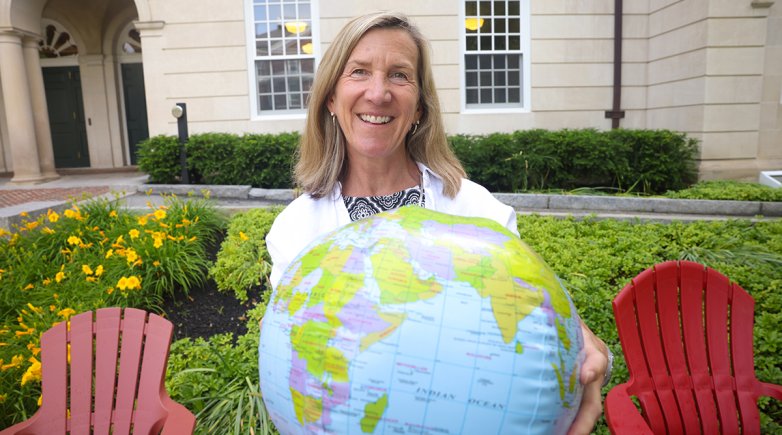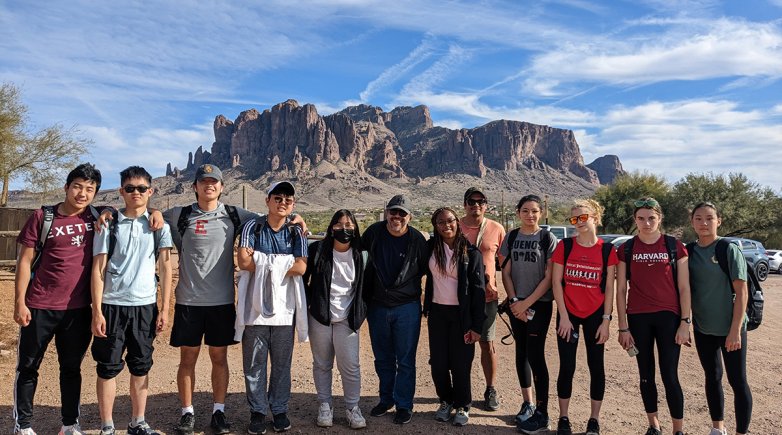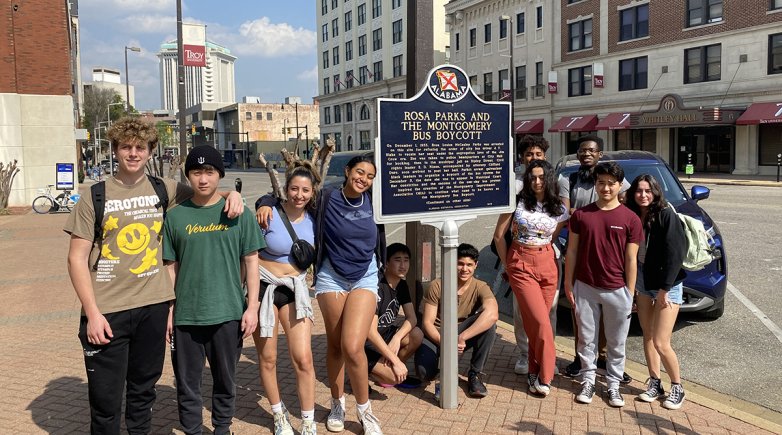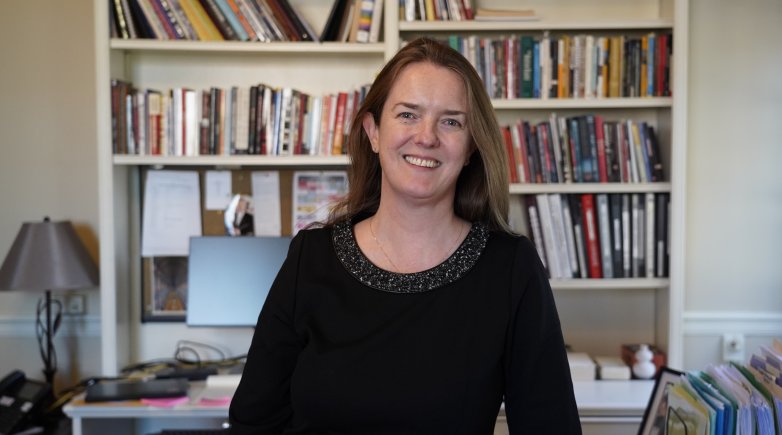A conversation with Patty Burke Hickey, director of Global Initiatives
Longtime educator taking Exeter's landmark experiential learning program to new places.
Patty Burke Hickey fell in love with travel early in her life, when her parents would pile their six children into the family station wagon and take off for a camping trip in one of the awe-inspiring national parks located across the United States. Later, while teaching at the American International School in Vienna, she relished meeting students and colleagues from all over the world and took full advantage of cheap air and train fares to travel throughout Europe.
As a member of Exeter’s English Department since 1996, and a full-time instructor since 2013, Burke has continued to nurture her passion for exploration. Through Exeter’s Global Initiatives program, launched in 2012, she chaperoned student trips to China and South Africa. In 2022, Burke became only the second director of Global Initiatives, embracing the chance to build on the work of her predecessor, Eimer Page, a fellow English instructor who is now dean of faculty.
“I love to travel myself, and I loved the idea of helping to create meaningful experiences for students,” Burke says. “Eimer built this office and put so many important structures in place, and I feel fortunate to be able to continue to help the office and our programs grow.”
Burke was also a longtime coach of JV and varsity cycling, served as dorm head in Langdell Hall and has been affiliated with Amen Hall, Gould House and Dunbar Hall. We spoke to her about her early experiences with experiential education, her travel bucket list and what cycling has to do with running the Global Initiatives program.
Could you talk a bit about the early travel experiences that have had an impact on your life?
We were a family of eight, and my parents just took us everywhere. I don't even think they ever went on a vacation by themselves. During my senior year in college, I studied in Alicante, Spain and loved it. I had enough AP credits to graduate early, and I ended up going to London with a work visa and one bag. I remember just getting off the plane and thinking — I don't even know where I'm staying tonight. I worked in London for a while, and then ended up working on a tall ship up in the North Sea.
After graduate school [at the University of Colorado] I ended up at the Colorado Rocky Mountain School. I think that's where my passion for experiential education came from, and the idea that so much of learning takes place outside the classroom. I was taking kids out into the wilderness and teaching them leadership skills and outdoor skills and how to help them navigate new situations and feel supported doing it. There’s incredible value to everything that happens inside the classroom, and then there's this rich landscape of learning that we as educators can help students navigate outside the classroom.
What do you see as the most important part of your role as director of Global Initiatives?
The most important part is making sure all the parts work together. I coached cycling for a while, and I love to ride. When you have a spoke that's out of true, your wheel starts to bend, and you don't have a smooth ride. In this position, all the spokes are important. Risk management and safety, all the planning and logistics, training chaperones, orienting students so that they know where they're going and what they're doing and the expectations — all these things work together, because you want everyone to have a safe and successful experience.
One of the things I love about this position is the collaboration with so many different people both on campus and our off-campus partners. I also want to give a shout-out to [Assistant Director of Global Initiatives] Chelsea Davidson, who does so much of the behind-the-scenes work and is so essential to the day-to-day functioning of this office.
Where do you see non sibi and other sort of core Exeter values in the Global Initiatives program?
We can think about non sibi a couple of different ways. When you're a part of a group that's traveling, you have to put the needs of the group above your own. You have to communicate your own needs, but you have to understand that the choices that you make impact the group.
There's that kind of non sibi that helps develop that community of travelers, and then there’s the non sibi when we go places. Not just — we went in and we built a house and then we left and we felt good about ourselves. Instead, it’s about community partnerships — how can I go into a community and try to listen and understand what's happening there? How can students learn from community leaders about a problem, what the community is doing, what kind of resources the community has or doesn't have, and how the students might contribute, participate in change, and learn. It may be a project that they work on, but they understand the roots about how this project came to be and the origins of the problem.
What are some of your goals for Global Initiatives going forward?
We’re expanding on our entrepreneurship programs, led by [History Instructor] Aykut Kilinc. There’s a lot of interest in business and innovation; we started in Berlin and now we’ve expanded to Singapore as well.
We’re also thinking about our programs through the lens of sustainability — being very intentional about why we travel, where we travel and what we do when we travel, and offering opportunities for students to learn about sustainability and climate change outside of the classroom. This November, we're offering a program in Costa Rica on ecotourism, sustainability and community partnerships. We’re also offering a program in New Orleans with a sustainability focus.
I’m also working with [Science Instructor and Bates-Russell Distinguished Faculty Professor] Anne Rankin on developing our student internship program, which offers experiences in a different way than our programs with groups and chaperones and itineraries.
Another important thing is looking at our programs through a DEIB [diversity, equity, inclusion and belonging] lens. For example, climate change in New Orleans and the impact of weather — how does it disproportionately affect certain communities, and how did those communities end up in sort of the below sea level or sea level areas? What's the relationship between climate change and socioeconomics and race?
What have been some of your all-time favorite travel destinations?
Vietnam and the Torres del Paine National Park in southern Chile.
Any places on your wish list for future travel?
Australia and New Zealand — but I feel like I would need a month. I’d like to go to Madagascar just because I like the sound of it. And I would love to go to Egypt. I could probably name a hundred places.



